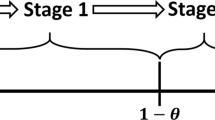Abstract
This article presents a model that provides an economic rationale for multilateral agreements, such as the WTO, that prohibit export subsidies. The model is a multicountry version of the well-known Brander and Spencer (Journal of International Economics (1985) 18, 83–100) analysis of profit-shifting export subsidies, with the addition of an opportunity cost of government revenue greater than unity, as in Neary (Journal of International Economics (1994) 37, 197–218) to capture the fact that the export subsidy will typically be funded by distortionary taxation. It explains the unilateral incentive for welfare-maximizing governments to provide export subsidies and shows how the multilateral prohibition of export subsidies may increase world welfare.
Similar content being viewed by others
References
Bagwell, K. and R.W. Staiger (1997) “Strategic Export Subsidies and Reciprocal Trade Agreements: The Natural Monopoly Case.” Japan and the World Economy 9:491–510.
Brander, J.A. and B.J. Spencer (1985) “Export Subsidies and International Market Share Rivalry.” Journal of International Economics 18:83–100.
Bulow, J.I., J.D. Geanakoplos, and P.D. Klemperer (1985) “Multimarket Oligopoly: Strategic Substitutes and Complements.” Journal of Political Economy 93:488–511.
Collie, D.R. (1993) “Profit-Shifting Export Subsidies and the Sustainability of Free Trade.” Scottish Journal of Political Economy 40:408–419.
Collie, D.R. (1997) “Bilateralism is Good: Trade Blocs and Strategic Export Subsidies.” Oxford Economic Papers 49:504–520.
Collie, D.R. (2000) “State Aid in the European Union: The Prohibition of Subsidies in an Integrated Market.” International Journal of Industrial Organisation 18:867–884.
Collie, D.R. and D. de Meza (1986) “Inadequacies of the Strategic Rationale of Export Subsidies.” Economics Letters 22:369–373.
Dixit, A.K. (1984) “International Trade Policy for Oligopolistic Industries.” Economic Journal 94 (Supplement):1–16.
Friedman, J.W. (1971) “A Non-Cooperative Equilibrium for Supergames.” Review of Economic Studies 38:1–12.
Neary, J.P. (1994) “Cost Asymmetries in International Subsidy Games: Should Governments Help Winners or Losers?'' Journal of International Economics 37:197–218.
Ray, J.E. (1995) Managing Official Export Credits: The Quest for a Global Regime. Washington, DC: Institute for International Economics.
Schott, J.J. (1994) The Uruguay Round: An Assessment. Washington, DC: Institute for International Economics.
Snow, A. and R.S. Warren (1996) “The Marginal Cost of Funds: Theory and Evidence.” Journal of Public Economics 61:289–305.
Author information
Authors and Affiliations
Rights and permissions
About this article
Cite this article
Collie, D.R. A Rationale for the WTO Prohibition of Export Subsidies: Strategic Export Subsidies and World Welfare. Open Economies Review 11, 229–245 (2000). https://doi.org/10.1023/A:1008322823299
Issue Date:
DOI: https://doi.org/10.1023/A:1008322823299




